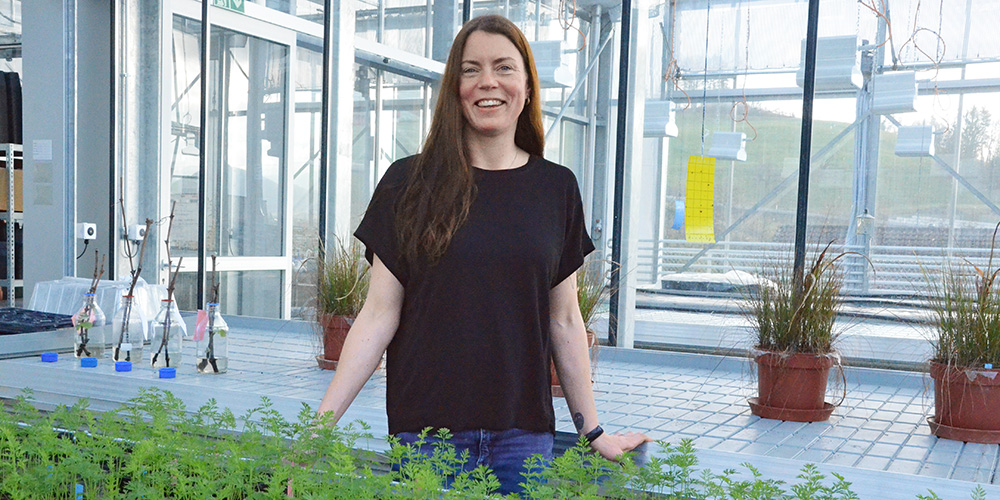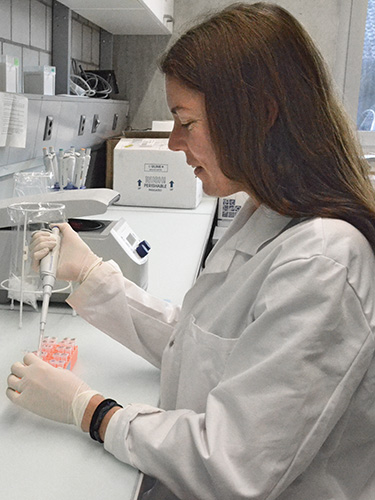In the field for mission “soil fertility”.
Text: Davina Benkert
What is it that makes good soil good? Biologist Sarah Symanczik is dedicated to finding the answer. She is currently conducting research into European wheat farming to determine what makes soil resistant to climate stress.
Dr. Sarah Symanczik studies how practitioners of organic farming can work with soil to increase yields and improve soil resistance to climate change. Symanczik, a biologist, laid the groundwork for this research in her dissertation, which she completed at the University of Basel’s Institute of Botany. Her dissertation focused on whether inoculating soil with mycorrhizal fungi could increase plant growth and resistance to drought. Mycorrhizal fungi are microorganisms that enter into natural symbiotic associations with plants through interactions with their root systems in the soil. Their extensive underground fungal networks allow plants to absorb nutrients from the soil more efficiently. If soil is depleted, however there may be fewer mycorrhizal fungi present. As a result, plants grow more slowly and produce smaller yields.
From theory to practice
Symanczik’s determination to use her research to help solve agricultural challenges motivated her to apply for a position at he Research Institute of Organic Agriculture (FiBL) in Frick, Switzerland after completing her doctorate in 2014. FiBL is one of the world’s leading institutes in the field of organic agriculture. The institute focuses on interdisciplinary research and pursues joint initiatives together with farms and the food industry. “During my studies, I was always more interested in applied research than I was in basic research. FiBL has a strong focus on practical applications and implementation of research findings. Working here and contributing to the development and increased acceptance of organic farming methods is my dream job,” explains an enthusiastic Symanczik.
In her first project following her dissertation, she studied whether it would be possible to increase the yield of date palms in Morocco by inoculating the soil with mycorrhizal fungi and ertilizing with compost. The trials were so successful, reports Symanczik with pride, that the date farmers who worked near to the test trees adopted the same methods for themselves.
As to the question of whether mycorrhizal fungi could help improve the yields of potatoes or wheat in Switzerland, Symanczik remains somewhat skeptical. The method is effective primarily for dry soils in regions that receive little precipitation, as soil fertility in these areas is normally lower. Most Swiss soils, in contrast, even those farmed using conventional methods, generally have a higher level of fertility. “The reason for that,” says Symanczik, “is that many Swiss farmers employ agricultural practices that increase soil fertility. That means that farmers apply crop rotation to prevent soil depletion and organic fertilizers and compost on a regular basis.”
Swiss soils under pressure
Yet the soil in Switzerland is facing increased stress due to climate change. “To protect the soil and the agricultural sector in Switzerland, we need to know our options for dealing with the effects of climate change. Wheat is one of the most critical staple foods in Europe, and it is of key importance for ensuring long-term food security,” says Symanczik, explaining the motivation underlying her current research project, which is funded by the Swiss National Science Foundation. She and her team have joined with European partners to study how different types of soil used for wheat cultivation respond to climate stress, such as drought or increased atmospheric CO2 concentrations, and investigate the behavior of soil microorganisms.
In a test field in France, the researchers explore how the soil responds when the weather is drier than average or when atmospheric carbon dioxide rises. “We want to learn what soil properties and microorganisms help increase soil’s resistance to stress and climate change. The goal is to protect agricultural yields in the long term so we can ensure a sufficient food supply.” Symanczik believes using organic farming methods is one of the best ways to do that.
More articles in the current issue of UNI NOVA.


